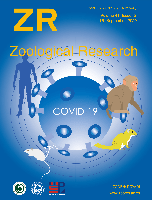
ZOOLOGICAL RESEARCH
Scope & Guideline
Innovating Conservation Practices for a Sustainable Future
Introduction
Aims and Scopes
- Animal Biology and Physiology:
Research in this area examines the physiological processes of various animal species, including their adaptations to environmental changes and physiological responses to stressors. - Genomics and Molecular Biology:
The journal publishes studies involving genome sequencing, genetic variations, and molecular mechanisms underlying traits such as disease resistance, reproductive strategies, and evolutionary adaptations. - Conservation Biology and Ecology:
Papers often address conservation strategies, habitat preservation, and ecological interactions among species, emphasizing the importance of biodiversity and ecosystem health. - Behavioral and Neurobiology:
Research articles delve into animal behavior, neurobiology, and the physiological basis of behavior, contributing to our understanding of animal cognition and social structures. - Comparative Anatomy and Morphology:
Studies in this category involve anatomical comparisons across species to elucidate evolutionary relationships and functional adaptations. - Environmental Adaptations:
The journal features research on how animals adapt to extreme environments, including climate change impacts, and physiological adaptations to hypoxia or temperature variations.
Trending and Emerging
- Multi-Omics Approaches:
There is a growing trend towards integrating genomics, transcriptomics, and metabolomics to provide comprehensive insights into biological processes and adaptations. - Applications of CRISPR and Genetic Engineering:
Research utilizing CRISPR technology for gene editing in various animal models has surged, highlighting the potential for genetic manipulation in studying diseases and evolutionary biology. - Animal Models for Human Disease:
The use of diverse animal models to explore human diseases, particularly zoonotic diseases and neurodegenerative conditions, has become increasingly prominent in the journal's publications. - Ecological Genomics and Adaptation Studies:
Research focusing on how genetic variation contributes to ecological adaptations in changing environments is on the rise, emphasizing the relevance of genetics in conservation efforts. - Neuroscience and Behavior Linkages:
An increasing number of studies are exploring the intersections between neurobiology and behavior, particularly in primate models, providing insights into cognition and social interactions.
Declining or Waning
- Traditional Taxonomy Studies:
Research purely focused on taxonomic classification without integrating molecular techniques has become less prominent, as the field increasingly values genetic and genomic data for species identification. - Basic Behavioral Studies:
Papers that only describe animal behaviors without exploring underlying mechanisms or ecological implications have decreased, reflecting a shift towards more integrative approaches. - Historical Biogeography:
While still relevant, studies solely focused on historical biogeography, without incorporating modern genomic techniques, are less common as researchers prioritize contemporary ecological and genetic analyses. - Physiological Studies in Isolation:
Research that examines physiological traits of species without connecting them to broader ecological or evolutionary contexts has diminished, as interdisciplinary approaches gain prominence.
Similar Journals
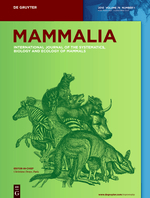
MAMMALIA
Innovating insights into animal science and behavior.MAMMALIA, published by Walter de Gruyter GmbH, is a renowned academic journal founded in 1936 that serves as a pivotal resource for researchers and professionals in the fields of Animal Science and Zoology as well as Ecology, Evolution, Behavior and Systematics. With an ISSN of 0025-1461 and an E-ISSN of 1864-1547, this journal has made significant contributions to mammalian research over the decades and continues to be pivotal in advancing knowledge within the scientific community. MAMMALIA is indexed in prominent databases, boasting a current Scopus ranking that places it within the upper echelons of the Q2 category in Animal Science and Zoology, and Q3 in Ecology, Evolution, Behavior and Systematics. Although it does not offer open access, the journal remains accessible through various academic institutions, ensuring that valuable research findings are disseminated widely. The journal’s commitment to quality and excellence in the study of mammals aligns with its high impact within the field, engaging a diverse readership that includes researchers, students, and professionals dedicated to furthering the understanding of mammalian biology. For more information, visit their office located at Genthiner Strasse 13, D-10785 Berlin, Germany.

ANIMAL BIOLOGY
Innovating Insights into Animal Behavior and EvolutionANIMAL BIOLOGY is a distinguished journal published by BRILL, focusing on the dynamic fields of Animal Science and Zoology, as well as Ecology, Evolution, Behavior, and Systematics. With an ISSN of 1570-7555 and an E-ISSN of 1570-7563, this quarterly journal serves as a pivotal platform for researchers and professionals seeking to contribute to the understanding of animal biology across diverse ecological contexts. The journal is recognized with a 2023 Scopus ranking of #234 out of 490 in the Animal Science and Zoology category, placing it within the 52nd percentile, alongside a rank of #409 out of 721 in Ecology, marking a solid contribution to the field. Although it currently holds a Q3 quartile in both categories, its commitment to quality research and novel insights continues to bolster its significance within the academic community. The open access option coupled with its publication history from 2003 to 2024 ensures a wide dissemination of knowledge, drawing in a global audience of researchers, professionals, and students eager to explore the intricacies of animal biology. By promoting high-quality discussions and innovative studies, ANIMAL BIOLOGY plays an essential role in advancing the understanding of life sciences and the evolution of biodiversity.

RUSSIAN JOURNAL OF THERIOLOGY
Cultivating Knowledge in the Biological SciencesRUSSIAN JOURNAL OF THERIOLOGY is a prominent academic journal published by KMK SCIENTIFIC PRESS LTD in collaboration with the esteemed Moscow State University. As a dedicated platform for researchers in the fields of Animal Science and Zoology, Ecology, Evolution, Behavior and Systematics, and Plant Science, this journal strives to advance our understanding of terrestrial ecosystems and their inhabitants. Although it currently holds a Q4 ranking and ranks within the lower percentiles of its respective categories, the journal's consistent publishing output since 2011 showcases a commitment to facilitating scientific discourse and collaboration. Addressed to a diverse audience of researchers, professionals, and students, RUSSIAN JOURNAL OF THERIOLOGY serves as an essential resource for disseminating valuable insights and fostering future advancements in the biological sciences.

Avian Biology Research
Bridging gaps in knowledge about avian physiology and conservation.Avian Biology Research, published by SAGE PUBLICATIONS LTD, is a leading journal dedicated to advancing the study of avian species through high-quality, peer-reviewed research. With an ISSN of 1758-1559 and an E-ISSN of 1758-1567, this journal has established itself as a vital resource within the fields of Animal Science and Zoology, as well as Ecology, Evolution, Behavior, and Systematics. The journal is currently ranked Q3 in both categories according to the 2023 release of the category quartiles, and it contributes significantly to the global understanding of avian biology, including behavior, physiology, and conservation efforts. Positioned within the competitive landscape of the Scopus rankings, it finds itself amidst a diverse array of research, with medical and environmental implications. As an open-access journal, Avian Biology Research ensures greater accessibility to its contents, fostering disseminative opportunities for researchers, professionals, and students alike. With a publication window spanning from 2008 to 2024, it continues to be an invaluable platform for the dissemination and dialogue of avian research, thereby enlightening future inquiries and driving scientific advancements in this crucial area of biology.

PAKISTAN JOURNAL OF ZOOLOGY
Championing the cause of conservation through academic excellence.Pakistan Journal of Zoology, established in 1975 and published by the Zoological Society of Pakistan, is a pivotal resource in the field of zoology and animal science, contributing to the academic discourse and research advancements in the region. With an ISSN of 0030-9923, this journal strives to disseminate innovative research findings and scholarly articles that explore various facets of animal biology, ecology, and conservation. Although classified in the Q4 quartile within the animal science category, its commitment to providing a platform for emerging researchers makes it crucial for those in the zoological community. The journal covers a broad range of topics relevant to contemporary issues in zoology, promoting both local and international collaborations. Situated in Lahore, Pakistan, its contributions are vital for promoting biodiversity awareness and conservation efforts within the region. Accessible research outputs empower students and professionals alike to engage in critical discussions and applications within the disciplines of zoology and animal science.
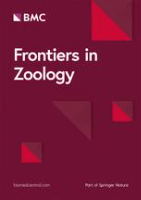
Frontiers in Zoology
Leading the charge in open-access zoological scholarship.Frontiers in Zoology is a premier, open-access journal published by BMC that has been a cornerstone of zoological research since its inception in 2004. With a commitment to advancing the field, this journal covers a broad spectrum of topics within Animal Science and Zoology, as well as Ecology, Evolution, Behavior, and Systematics. Recognized for its quality, it holds a distinguished Q1 ranking in both of these categories and ranks within the top percentiles in Scopus, with 87th and 78th percentiles, respectively. Based in the United Kingdom, it provides researchers, professionals, and students with innovative studies and findings that encourage interdisciplinary collaboration and exploration. The journal is dedicated to facilitating the open exchange of scientific knowledge, making it an essential resource for those seeking to stay at the forefront of zoological and ecological sciences.

Journal of Experimental Zoology Part A-Ecological and Integrative Physiology
Advancing ecological insights through integrative physiology.The Journal of Experimental Zoology Part A - Ecological and Integrative Physiology, published by WILEY, is a distinguished peer-reviewed journal focusing on ecological and evolutionary physiology, providing a robust platform for research that bridges both ecological and integrative physiological concepts. With an impressive impact factor and recognition as a Q1 journal in both Animal Science and Zoology and Ecology, Evolution, Behavior and Systematics in 2023, it positions itself as a leader in advancing our understanding of organismal biology and environmental interactions. The journal is committed to open access, offering researchers and professionals worldwide the opportunity to share and disseminate their findings freely. Since its inception in 2017, it has rapidly gained prominence—ranking within the top percentiles of Scopus Ranks across several disciplines, including genetics and molecular biology. This not only underscores its relevance but also highlights its vital role in facilitating interdisciplinary approaches essential for addressing contemporary biological challenges. Researchers, educators, and students alike will find in this journal a valuable resource for cutting-edge studies and innovative methodologies in the field.
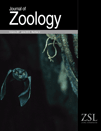
JOURNAL OF ZOOLOGY
Championing research that shapes the future of zoology.JOURNAL OF ZOOLOGY, published by Wiley, stands as a premier scholarly journal in the fields of Animal Science and Zoology, renowned for its outstanding contributions to the knowledge of animal biology and ecology. With an impressive impact factor and a strong ranking in the Q1 category for Animal Science and Zoology, as well as Q2 for Ecology, Evolution, Behavior, and Systematics, the journal rigorously engages with both foundational research and groundbreaking discoveries since its inception in 1830. Located in Hoboken, New Jersey, this journal is dedicated to fostering the academic community's understanding of zoological sciences, providing access to important research that shapes wildlife conservation efforts and ecological studies. Although the journal does not currently offer open access options, it continues to attract significant attention, as evidenced by its strong Scopus rankings in related categories. Researchers, professionals, and students will find invaluable resources in the JOURNAL OF ZOOLOGY to advance their understanding of animal life and the ecological challenges it faces today.

AUSTRALIAN JOURNAL OF ZOOLOGY
Innovating Conservation Through Research and DiscoveryAustralian Journal of Zoology, published by CSIRO PUBLISHING, serves as a premier platform for research in the fields of animal science and zoology, with a profound commitment to advancing our understanding of wildlife and ecosystems. Featuring an ISSN of 0004-959X and an E-ISSN of 1446-5698, this esteemed journal encompasses a wide range of topics relevant to ecology, evolution, behavior, and systematics. For the year 2023, it holds a commendable Q2 ranking in both Animal Science and Zoology and Ecology, Evolution, Behavior, and Systematics, demonstrating its significant impact within the academic community. With a rich publication history spanning from 1952 to 2024, the journal caters to researchers, professionals, and students by disseminating crucial findings and methodologies that contribute to effective conservation efforts and informed ecological practices. Although not an open access journal, it continues to foster collaboration and discussion among scholars in Australia and beyond. Located in Clayton, Victoria, the journal remains dedicated to its objective of enhancing knowledge in zoological sciences and addressing vital environmental challenges.
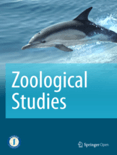
ZOOLOGICAL STUDIES
Fostering knowledge that inspires conservation efforts.Zoological Studies, published by the Biodiversity Research Center, Academia Sinica, stands as a pivotal journal in the fields of animal science and zoology. With the ISSN 1021-5506 and E-ISSN 1810-522X, this Taiwanese journal features a blend of pioneering research that spans over three decades, from 1994 to 2024, fostering a deep understanding of biodiversity and zoological phenomena. Recognized for its scholarly contributions, Zoological Studies holds an esteemed Q2 ranking in Animal Science and Zoology for 2023, positioning it among the top-tier journals in its category with a Scopus rank of #164 out of 490—reflecting its strong impact and outreach. While currently not open access, the journal aims to disseminate essential findings and discussions that advance ecological knowledge and inspire future research endeavors. Researchers, professionals, and students alike will find this journal an invaluable resource for accessing critical studies that drive innovation and conservation efforts in the field of zoology.